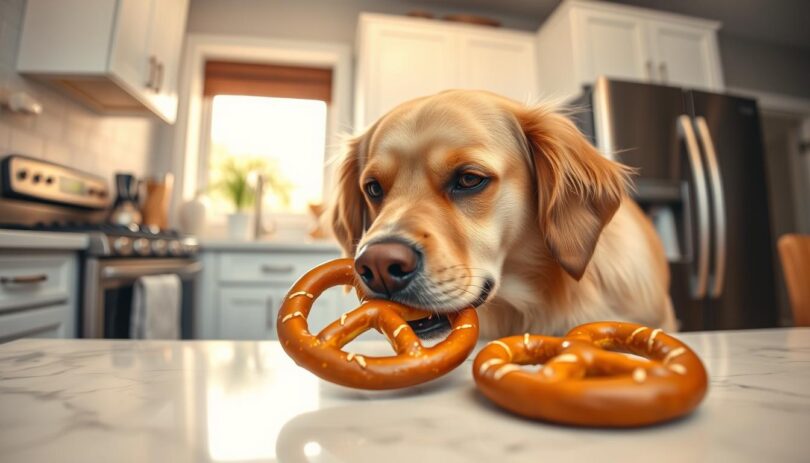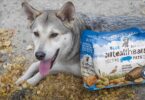Pretzels are a beloved snack for many humans, coming in various shapes and flavors. Whether twisted, braided, or sprinkled with sesame seeds, they’re a convenient and tasty treat. But have you ever wondered if your furry friend can share in this snack?
While pretzels can be safe for dogs in very limited amounts, they offer little nutritional value. They’re high in salt and carbohydrates, which can harm your pup’s health if consumed regularly. Additionally, some pretzels contain toxic additives like xylitol, making them dangerous for dogs.
This article explores the ingredients, varieties, and risks associated with pretzels for dogs. We’ll also discuss safer alternatives to keep your pet healthy and happy.
Understanding Pretzel Ingredients and Their Impact on Dog Health
Pretzels are made from ingredients like refined flour, salt, and sometimes added sweeteners or flavors. While these may be harmless to humans, they can pose risks to your dog’s health.
High Sodium Levels and Associated Risks
Pretzels are high in sodium, which can lead to dehydration and kidney stress in dogs. Excessive salt intake can cause symptoms like increased thirst, vomiting, and diarrhea. Over time, this can result in kidney damage.
Excess Carbohydrates and Nutritional Concerns
Pretzels are mostly carbohydrates, which offer little nutritional value for dogs. Dogs thrive on protein-rich diets, and too many carbs can lead to weight gain and blood sugar issues.
Check pretzel labels for harmful additives like xylitol, a common artificial sweetener that’s toxic to dogs. Even small amounts can cause a dangerous drop in blood sugar and potentially lead to liver failure.
Regular consumption of pretzels can lead to serious health issues due to their high salt and carb content. It’s crucial to monitor the amount and ingredients to keep your dog safe.
For more information on keeping your dog’s diet safe, visit our resource on dog food safety.
Exploring Common Pretzel Varieties and Their Components
Pretzels come in two main forms: hard and soft. While they may look and taste different, both types share similar nutritional profiles that aren’t ideal for your dog’s diet.
Hard Pretzels: Crunchy and Crisp
Hard pretzels are the crunchy, dry version you often find in bags. They have a low moisture content, making them last longer on the shelf. These pretzels are usually seasoned with salt and sometimes other flavorings. While they might seem like a harmless snack for your dog, the high sodium content can still pose risks, especially if your pet has health conditions like high blood pressure or heart disease.
Soft Pretzels: Doughy and Delicious
Soft pretzels are the larger, doughier ones you might enjoy at a ballpark or fair. They’re often served warm and topped with salt or sesame seeds. Despite their different texture, soft pretzels are just as high in carbs and salt as their hard counterparts. Feeding your dog soft pretzels regularly can lead to weight gain and other health issues due to their carbohydrate content.
Both hard and soft pretzels lack the nutritional value your dog needs. They’re primarily made of refined flour and salt, offering little benefit beyond fleeting satisfaction. For a healthier snack option, consider nutritious fruits or vegetables that provide essential vitamins and minerals without the risks associated with pretzels.
can dogs eat pretzels? Evaluating Safety and Potential Dangers
While pretzels might seem like a harmless treat, they pose several risks to your dog’s health. Understanding these dangers is crucial for keeping your pet safe.
Identifying Toxic Additives: Xylitol and More
Pretzels often contain harmful ingredients like xylitol, an artificial sweetener toxic to dogs. Even small amounts can cause a dangerous drop in blood sugar, leading to seizures or liver failure. Seasonings such as garlic and onion are also harmful, as they can damage your dog’s red blood cells and lead to anemia.
Risks from Added Flavors and Coatings
Flavored or coated pretzels, such as those with chocolate or yogurt, introduce additional sugars and fats, increasing health risks. High salt levels can cause dehydration, high blood pressure, and, in severe cases, salt poisoning. Symptoms include vomiting, diarrhea, and seizures.
Always read labels carefully and avoid pretzels with toxic ingredients. For more information on keeping your dog’s diet safe, visit our resource on dog food safety.
Healthier Snack Alternatives for Your Dog
While pretzels can be an occasional treat for dogs, they’re not the healthiest option due to their high salt and carbohydrate content. Fortunately, there are plenty of nutritious alternatives that can satisfy your pup’s snack cravings without risking their health.
Nutritious Fruits, Vegetables, and Proteins
Fresh fruits like apples (without seeds) and bananas are great options. They’re packed with vitamins and fiber, making them a wholesome choice. Carrots and celery are also excellent crunchy snacks that support dental health. For protein lovers, boiled chicken or turkey provides lean, easily digestible options.
DIY Treats and Dog-friendly Recipes
Homemade treats are a fantastic way to control ingredients. Try making peanut butter-filled Kongs or freezing pumpkin cubes for a soothing snack. You can also bake healthy biscuits using dog-safe ingredients like oats and sweet potatoes. These DIY options ensure your pup gets only what’s best for them.
For more tailored advice, consider consulting vet-approved recipes to keep your dog’s diet balanced and nutritious. Remember, snacks should make up only a small part of their daily intake, so choose wisely for their well-being.
Final Thoughts on Pretzels and Your Dog’s Well-being
In conclusion, while an occasional pretzel is unlikely to harm your dog, it’s important to remember that pretzels are not a suitable regular snack for your pet. High sodium levels, excessive carbohydrates, and potential additives like xylitol make them a risky choice for your dog’s health.
Always prioritize your dog’s well-being by choosing vet-approved treats or healthy alternatives like fruits and vegetables. If you suspect your dog has ingested a harmful ingredient, consult your veterinarian promptly. Making informed decisions today helps safeguard your dog’s health for tomorrow.
FAQ
Are pretzels safe for dogs to eat?
Pretzels are not toxic to dogs, but they can pose health risks due to high sodium and carbohydrate content. Overconsumption may lead to issues like bloating or electrolyte imbalances. Always moderation is key.
What ingredients in pretzels could harm my dog?
High sodium levels are the primary concern, as they can lead to hypernatremia. Additionally, some pretzels contain xylitol, garlic, or onion, which are toxic to dogs. Always check the ingredient list before sharing.
How much sodium is too much for my dog?
Dogs should consume less than 100-200mg of sodium per day. Pretzels often exceed this limit, so even small amounts can be harmful. Monitor your pup’s behavior and consult a vet if you notice signs of distress.
Can I give my dog soft pretzels instead of hard ones?
Soft pretzels are still high in sodium and carbs, similar to hard pretzels. The texture difference doesn’t make them safer. It’s best to limit all pretzel types or avoid them altogether.










Leave a Comment